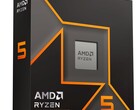The much-awaited AMD Ryzen 9950X3D and Ryzen 9900X3D, which were unveiled at CES 2025, have finally been launched today. The latest X3D processors, dubbed the “most advanced gaming CPUs”, have rolled out and can be ordered from online retailers like Newegg and Amazon.
At the moment, here’s where the new CPUs are available online -
- AMD Ryzen 9950X3D is available for $699.99 on Newegg
- AMD Ryzen 9900X3D is available for $599.99 on Newegg
- AMD Ryzen 9950X3D is available for $699.99 on Amazon
- AMD Ryzen 9900X3D is available for $599.99 on Amazon
After the launch of the Ryzen 7 9800X3D, the AMD Ryzen 9950X3D and the Ryzen 9900X3D are the latest additions to the 9000 series CPU family. The Ryzen 9950X3D is the top SKU, and it shares a lot of features with the Ryzen 9950X (curr. $541.73 at Amazon). The processor features 16 cores and 32 threads and a boost clock speed of up to 5.7 GHz at 170W TDP. The highlight here is the 3D V-Cache boosted CCD that can offer up to 144 MB of total cache.
In our hands-on AMD Ryzen 9950X3D review, we found out that the processor is on par with the Intel Core Ultra 9 285K, the Core i9-14900K, and the Ryzen 9 9950X based on the cumulative CPU benchmarks. The processor showed great results in productivity and gaming benchmarks, with the new gen V-Cache boosting performance in the latter.
Meanwhile, the AMD Ryzen 9 9900X3D has a lot in common with the Ryzen 9900X (curr $378.65 on Amazon). Both processors have the same core configuration of 12 cores, 24 threads, and 64 MB of L3 cache across its two CCDs, with one of the CCDs including a 2nd Generation 3D V-Cache stack, increasing the total cache capacity to 140 MB. The Ryzen 9900X3D can deliver a boost clock up to 5.5GHz, which is slightly lower than the 9900X - although both chips come in a 120 TDP package.
As mentioned earlier, these two also feature the signature 3D V-Cache technology but with some improvements. The 2nd gen 3D V-Cache enables both chips to operate at cooler temperatures and provides significant overclocking potential. Further, both chips support standard CO and PBO utilities.
Source(s)
AMD









